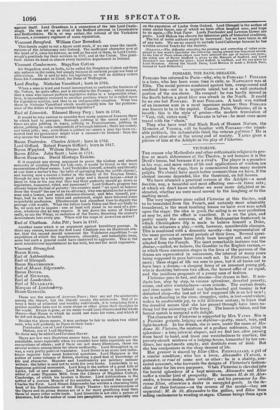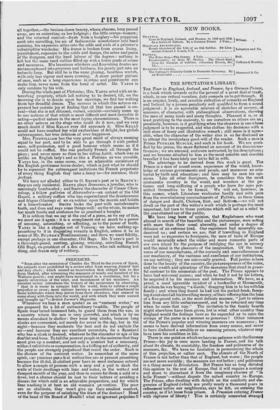VICTORINE.
THE reason why Methodists and other enthusiastic religionists pro- fess so much abhorrence of the Theatre, is not because it is the Devil's house, but because it is a rivers. The player is a preacher in his way, and more rules of life and applications of wisdom are adopted from the stage, than is remembered from many modern pulpits. We should have much better sermons than we have, if the clerical income depended, like the theatrical, on full houses. We have attended a practical sermon at the Adelphi—a most forcible, nay, a beautiful and most affecting one—in three acts ; at which we don't know whether we were more delighted or in- structed, whether we were most moved to the laughing or to the melting mood.
The very ingenious piece called Victorine at this theatre, said to be translated from the , French, and certainly most admirably transferred, is the most touching lesson we have ever seen acted upon the stage: the idea is good, the acting is as near perfection as may be, and the effect is excellent. It is on the plan, and pretty nearly the converse, of the Shakspearian framework in which Christopher° Sly is made to believe himself a Duke, while he witnesses a play,—with, however, considerable changes. This is combined with a dramatic novelty—the representation of the same persons at several periods of their lives. Several speci- mens of this scheme have lately been brought out, and all are adapted from the French. The most remarkable instance was the Joueur,—called, we believe, the Gambler in the English version,— in which three successive stages in the lives of the persons of the drama are represented in succession, the interval of many years being supposed to pass between each act. In Victorine, there is . more ; three stages of life are seen to pass, but it all turns out to have been a dream,—a sleeping fancy of an innocent young girl, who is doubting between two offers, the honest offer of an equal, and the insidious proposals of a young man of fashion. rictorine goes to bed, and dreams—the drama in fact. It con-
ducts her, step by step, to vicious splendour, deserted poverty, crime, and utter wretchedness—even suicide. The curtain drops, and rises again: we behold our light-hearted girl tossing in her disturbed sleep—the last act of her supposed life is on her rnnd ; she is suffocating in the river, struggles, sinks, is lost—and wakes; wakes to unutterable joy, to wild delirious ecstasy, to learn that the dreadful scenes that she has passed through have been no- thing but the colouring of the fancy. The lesson is taken, and the honest match is accepted with delight. •
The character of Victorine is supported by Mrs. YATES. She is a Parisian grisette, lodging au dixijme—pretty, smart, vain, and light-hearted. In her dream, she is seen, under the name of Ma- dame St. Victoire, the mistress of a profuse nobleman, living in splendour : a long interval elapses, and we find her, after passing from hand to hand, and from one wretchedness to another, the poverty-struck mistress of a lodging-house, tormented by her cre- ditors, her apartments empty, and destitute even of food. But she has companions in the steep descent of life. Her grenier is shared by Elise (Mrs. FiTzwimaaar), a girl of a similar condition ; who has a lover, Alexandre (YATEs), a gamester, or roué of some sort or other : he is a shabby, con- ceited coxcomb, who forwards the designs of Vi ctorine's fashion- able suitor for his own purposes. When Victorine is elevated into the horrid splendour of a kept mistress, Alexandre and Elise suffer a similar kind of prosperity. He becomes M. de St. Alex- andre, a horse-deakr, alias swindler; and his paramour La Ba- yonne Elise, otherwise a dealer in smuggled goods. In the de- cline of their fortunes—on the reverse of the medal—they are separated: M. de St. Alexandre to the gallies, and Elise from selling cachemeres to vending or.inges. Chance brings them aga n all together,—the broken-down beauty, whose charms, long passed away, are as uninviting as her lodgings ; the little orange-woman ; and the returned convict—fresh from a burglary—his puppyism sunk into snivelling, his air of fashionable nonchalance into hard cunning, his expensive attire into the odds and ends of a prlsonees 'subsetapticrrwardrobe.— His frame is broken from coarse living, piinishinent, exposure to the colds and damps, the aches and pains Of the dtingeon;.and the:hard labour of the bagnes : nothing is left but the same hard outline filled up with a lower grade of crime and meanness. His luxurious whiskers and flourishing brutus are metamorphosed into greyness and baldness, his jaunty gait into an imbecile limp. But still he is the same glozing, heartless wretch, with only less vigour and more cunning. A more perfect picture of man, such as a long experience in crime and punishment can make him, never came from the hand of artist. Mr. YATES is only outdone by his wife. During the whole part of Victorine, Mrs. YATES acted with an in- teresting propriety, which left nothing to be desired, till, on the morning she is to decide upon her marriage, we find her waking from her dreadful dream. The manner in which this actress ex- pressed her ecstatic joy at finding that all that has passed is un- real—that she is not debased, ruined, suicidal—certainly came up to our notions of that which is most difficult and most desirable in acting—perfect nature in the most trying circumstances. There is no other actress on the stage who could do it now, and we very much doubt if Miss KELLY ever did approach it. Miss KELLY could not have reached her wild exuberance of delight, her girlish extravagance, her true delirium of over-happiness. Mrs. FITZWILLIAM has the very great merit of always seeming equal to her part, and to be able to go through it with perfect ease, self-possession, and a good humour which seems as if it could not be ruffled. She was perfectly French all through the piece ; and never more so than in her riding-habit, which was as unlike an English lady's and as like a Parisian as was possible. YATES too, in the same scene, was an admirable caricature of the English gentleman horse-dealer; which is just what he should be to represent the extravagant imitations the French perpetrate of every thing English they take a fancy to—for instance, their jockeys. We have not alluded either to 0. SMITH'S part or to REEVE'S : they are only incidental. REEVE plays Bonassus, a jeweller, who is amusingly bamboozled.; and SMITH the character of Ccesar Chan- teloup, a fellow galerzen of Alexandre's—an outcast of the Old Guard, a military ruffian who has superinduced the drunkenness and blogue (blarney) of an ex-soldier upon the. morals and habits of a housebreaker. SMITH looks the part with melodramatic truth, and does and says some things well: on the whole, he makes too much bustle and confusion for so practised a burglar. It is seldom that we say at the end of a piece, as we say of this, we must see it again : it is a compliment not so much to a power of amusing, astonishing, or affecting, as to the power of truth. YATES is like a chapter out of Vu:loco: we have nothing ap- proaching to it in disgifsting veracity in English, unless it be in some of Mr. Binwisa'aTomlinsoniana ; and there we want fidelity, except perhaps in one character, Old Bags. Mr. YATES'S Mart is a thorough-paced, canting, Oozing, whining, snivelling 1 rench Old Bags, ex-president of a den of thieves, who talk nothing but slang, and dream only of robbery.



























 Previous page
Previous page